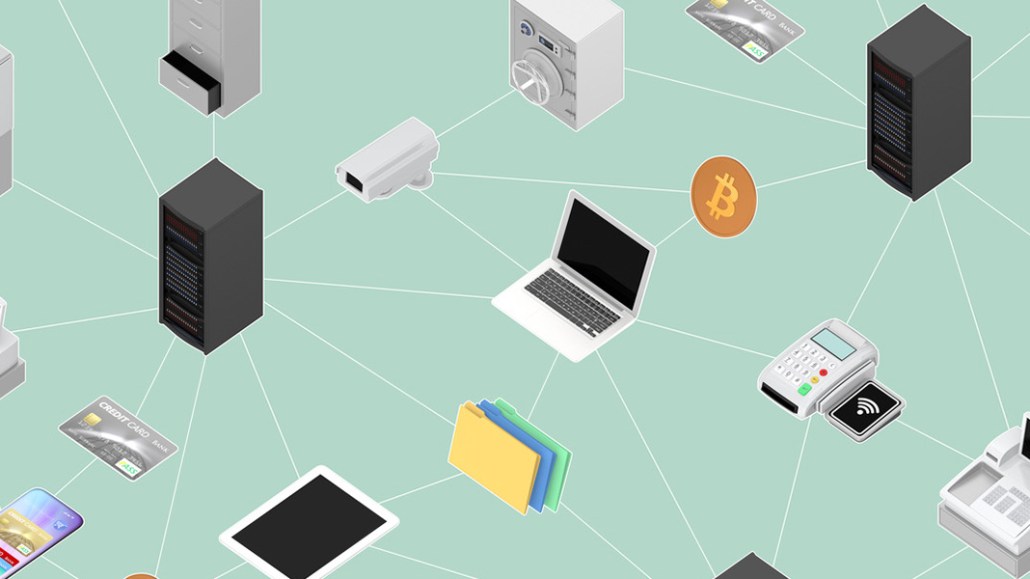Secure your place at the Digiday Publishing Summit in Vail, March 23-25

Like with any overhyped topic, the buzz around blockchain and cryptocurrencies is blurring the lines between fact and fiction.
Ongoing problems like bot fraud, ad misplacement scandals and the long-criticized opacity of the programmatic ad trading ecosystem have led businesses to latch on desperately to blockchain as the potential cure that can fix what many have described as a broken advertising model.
There are some positive use cases for blockchain, like how it can be used to track financial transactions as money through the programmatic supply chain. But a lot of the noise around how the technology can be applied to advertising and media is just that: noise. Here’s a look at myths about blockchain’s use within advertising.
Myth: It’s the panacea for fixing ad fraud
Using blockchain to fix the issues of ad fraud and transparency sounds great in theory, but it’s probably too good to be true. For starters, blockchain works in a decentralized format, where networks around the world verify transactions. Given the speed at which ad transactions occur (hundreds of thousands per second), blockchain can’t yet validate transactions fast enough, creating latency problems. To counter this, some ad tech vendors are aggregating ad transactions into one block to create a single transaction. “That means the data is aggregated, so the transparency is already under question there,” said Elena Yegorova, CTO at ad tech firm London Media Exchange.
Another barrier: Everyone in the value chain needs to apply blockchain software to achieve full transparency in digital ad transactions. Otherwise, it will only be a “snapshot” of transparency, Yegorova added. Because it’s costly to implement, many industry observers believe it’s unlikely that every business will adopt it. “You’re looking at a minimum of hundreds of thousands [of pounds] for implementation, plus ongoing costs,” she said.
Myth: Blockchain is bitcoin
Blockchain is not the same as bitcoin, but the noise around both is causing confusion. Some believe the mania around cryptocurrencies is having a negative impact on blockchain’s future. “There is ignorance about the differences between bitcoin and blockchain, and because there is this bubble of cryptocurrencies raising billions in ICOs [initial coin offerings] and the fact a lot of those ICOs were not legitimate businesses, that sets a question mark around the whole piece, which is unwarranted and not right,” said Mary Keane-Dawson, CEO of media agency Truth, which uses blockchain technology. There’s a fair amount of posturing around blockchain, with people claiming they understand it when they don’t, according to Keane-Dawson.
One of the main points of confusion is the difference between the type of token needed for blockchain and the kind needed for cryptocurrencies. “You do need a token to run blockchain, but it can be a utility like a bit of programming that activates an event in the ad tech value chain, rather than a coin,” said Keane-Dawson. “If you want to have a coin that is traceable, then inevitably you’re going to have volatility. And in the media and advertising space, we couldn’t do that, as it would lead to clients and customers not really understanding what their token is worth today.”
Myth: It’s a chance to make a quick buck
Dogged by issues like hidden tech fees, arbitrage and bot fraud, programmatic ad trading hasn’t earned the best reputation this year. That’s why so many people are jumping on the blockchain bandwagon to paint themselves as companies trying to solve the crisis, not add to it. But it’ll be relatively easy to separate the genuine attempts from the opportunists. “If you announce blockchain, it must be certified and audited, so it is difficult to fake it,” Yegorova said. Expect a bunch of companies that have loudly touted their plans to build blockchain businesses quietly fade away once they realize what it will take, and how much it will cost, to build one.
Myth: Blockchain’s most useful application within advertising is cracking fraud
Those that don’t think blockchain will fix ad fraud and transparency issues believe better uses exist for the technology: to help publishers, ad tech vendors and marketers keep on top of consumer consent once the General Data Protection Regulation, and potentially the ePrivacy Regulation, are enforced. That would also potentially give independent ad tech vendors a fighting chance against the likes of data-rich companies like Google, Facebook and Amazon when it comes to competing in a post-GDPR world, according to Ciaran O’Kane, CEO of ExchangeWire. “Blockchain really could be transformational in advertising, just not for inventory transparency purposes but for data use and privacy,” he said.
More in Media

The case for and against publisher content marketplaces
The debate isn’t whether publishers want marketplaces. It’s whether the economics support them.

Urban Outfitters shifts its influencer strategy from reach to participation
Me@UO is Urban Outfitters’ new creator program leverage micro-creators with smaller, engaged communities that are passionate about the brand.

Media Briefing: Without transparency, publishers can’t tell if Google’s Preferred Sources feature benefits them
Six months in, Google’s Preferred Sources promises loyalty-driven visibility, but leaves publishers guessing at the traffic impact.








